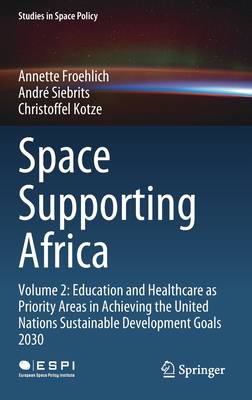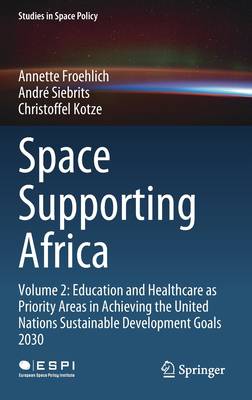
- Retrait gratuit dans votre magasin Club
- 7.000.000 titres dans notre catalogue
- Payer en toute sécurité
- Toujours un magasin près de chez vous
- Retrait gratuit dans votre magasin Club
- 7.000.0000 titres dans notre catalogue
- Payer en toute sécurité
- Toujours un magasin près de chez vous
Space Supporting Africa
Volume 2: Education and Healthcare as Priority Areas in Achieving the United Nations Sustainable Development Goals 2030
Annette Froehlich, André Siebrits, Christoffel KotzeDescription
This book addresses the need to support decision-makers across Africa by promoting awareness of the importance of space technologies and data to African development through the presentation of existing examples where space supports education and healthcare, and by making recommendations for further roll-out of these efforts. This is necessary because of the enduring misconception that space-related research and expenditure competes with other, more pressing, needs on the continent, when in truth space can play a major role in meeting these needs.
Accordingly, the book unpacks the United Nations Sustainable Development Goals (SDGs) 2030 and the critical needs they address in the African context. Secondly, it provides an analysis of the African higher education landscape and considers the network of higher education-related SDGs, their targets, and their indicators. Africa's own development plan, Agenda 2063, is also explored. The African higher education landscape is then assessed by way of three models - the Space-Education Equation (SEE), the Benefits to Education by Space Transection (BEST), and the Enhanced Education for Sustainable Development Access and Success (EESDAS) model. The critical role of educational technologies and e-learning in bridging the educational access and success gap is appraised, as is the role of the space sector, and its technologies, applications, and data in African higher education. Finally, it explores e-health and provides an analysis of pertinent technologies required by e-health, past and present, and the opportunities and challenges it presents. Space technology can play a critical role in eliminating the barriers that are currently preventing e-health from playing a more significant role in a developing region such as sub-Saharan Africa.
Spécifications
Parties prenantes
- Auteur(s) :
- Editeur:
Contenu
- Nombre de pages :
- 205
- Langue:
- Anglais
- Collection :
- Tome:
- n° 27
Caractéristiques
- EAN:
- 9783030617790
- Date de parution :
- 20-12-20
- Format:
- Livre relié
- Format numérique:
- Genaaid
- Dimensions :
- 156 mm x 234 mm
- Poids :
- 512 g

Les avis
Nous publions uniquement les avis qui respectent les conditions requises. Consultez nos conditions pour les avis.






